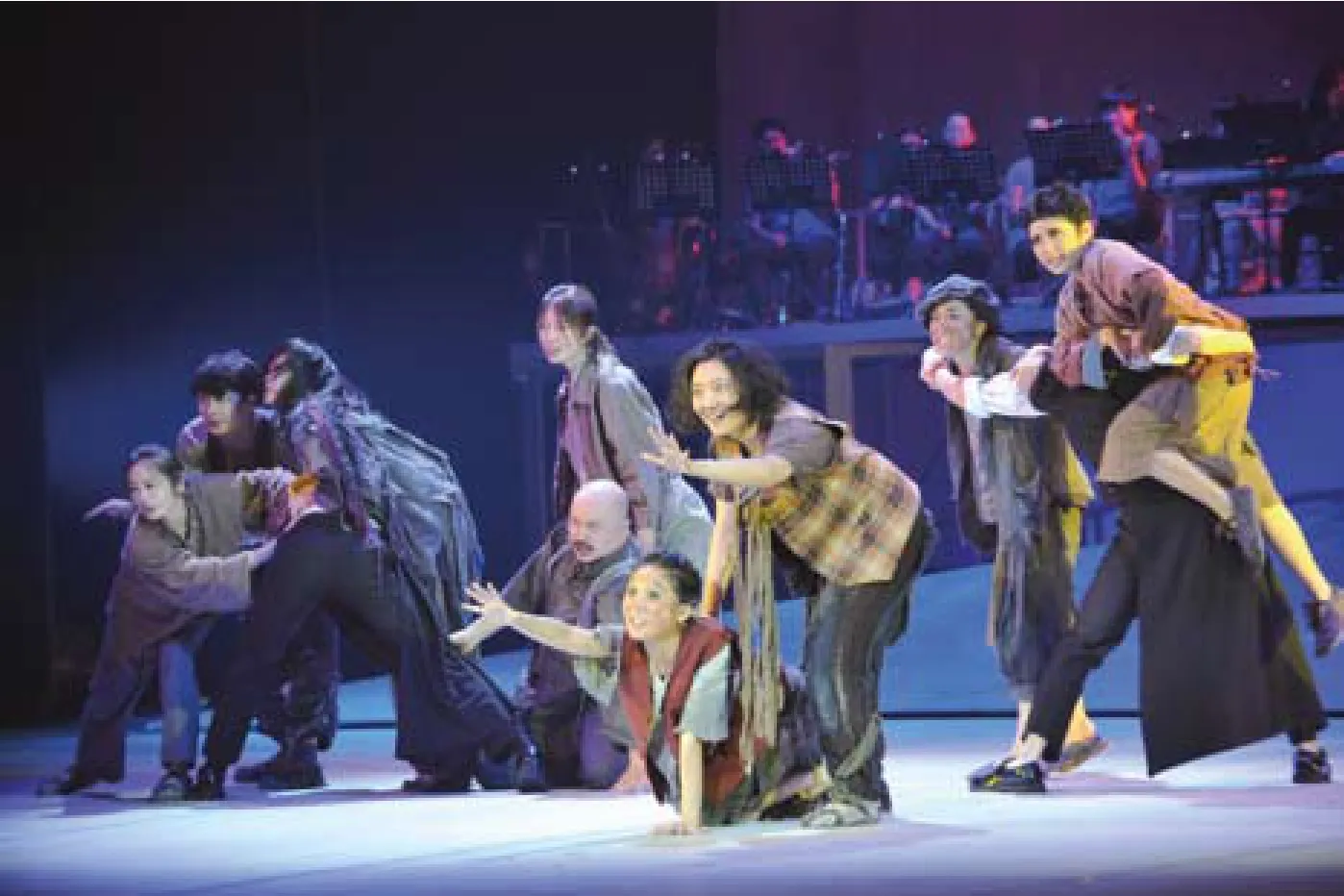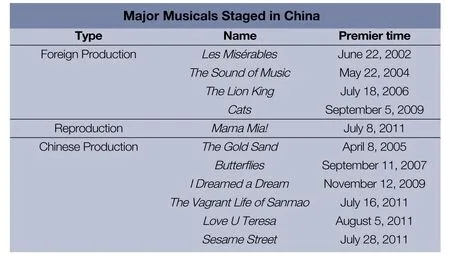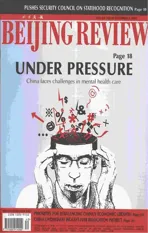Taking the Stage
2011-10-14ByZHOUXIAOYAN
By ZHOU XIAOYAN
Taking the Stage
By ZHOU XIAOYAN
China’s musical theater market has yet to take shape for a homegrown repertoire to expand
The past summer offered an interesting variety of musical performances. While the Chinese version ofMama Mia!,one of the most popular musicals in the world, tours China on a 200-performance run, homegrown musicals are also gaining ground.
Love U Teresa, an original musical about influential Taiwanese Chinese pop singer Teresa Teng (1953-95), has been staged in Beijing since August 5.The Broken Bridge, a large-scale musical featuring a cross-Straits love story spanning 60 years produced with funds from the Hangzhou Municipal Government,will be staged in the famous tourism city in Zhejiang Province from September 15 to 22. Musicals for children, such asThe Vagrant Life of SanmaoandSesame Street,are also piquing the interest of younger audiences.
Musical productions in China are going through a tri-phased development: fostering the market and audiences by introducing foreign classics; learning standard production and operation procedures and establishing professional teams by reproducing classic musicals; and creating original musicals with Chinese elements and staging them overseas,said Zhang Yu, Chairman of the China Arts and Entertainment Group, one of the three investors for the Chinese version ofMama Mia!.
Market yet to form
Although musical theater has attracted lots of public attention this summer, people working in the industry have a common view that the market still needs time to develop.
Despite its global presence for the past two centuries, musicals arrived on the scene relatively late in China compared with movie and stage performance genres, such as concerts, opera, ballet and drama. Chinese theater circles began studying and producing musicals in the 1980s alongside the development of popular music.

REPRODUCING CLASSICS: Actors give vivid performance in the homegrown musical The Vagrant Life of Sanmao, which reproduces the classic image of a poor orphan,on stage
China’s first homegrown musical,Our Modern Youth, was produced by the China National Opera House in 1982. It was followed by a number of musical productions by academies and various opera and drama troupes through the 1980s and 90s.
“But there really isn’t a market for musicals in China just yet,” said San Bao,China’s renowned composer, who composed music for musicals such asThe Gold Sand,Butter fl iesandThe Vagrant Life of Sanmao.
“Although there are dozens of original musicals each year, Chinese audiences know little about musicals, not to mention getting in the habit of going to musicals and appreciating them,” said San Bao. “I think it will take China at least 50 years to form a mature musical theater market.”
Li Suyou, a famous producer and former teacher at the Shanghai Conservatory of Music, shared the same view.
“Only if audience size increases enough,then they support people working in the industry. But the number of people willing and able to pay to see musicals hasn’t formed,which is why we think the market hasn’t really come into existence,” Li said.
In addition, Chinese audiences often confuse musical theater with opera or drama because the concept is so new that few Chinese really understand it, said Zhang Aojia, heroine of the Chinese version ofMama Mia!.
The market for musicals in China has yet to take shape, but it will be huge once formed, given the country’s large population,said Li.

YANG GUANG
“If 1 percent of Chinese people are willing to buy tickets for musicals,the market will be beyond imagination,” said Li. “Now Broadway and West End producers are keeping a sharp eye on the market performance of the Chinese version ofMama Mia!. They will dash to China as soon as they find it’s a lucrative business, just like Hollywood had done with its movie industry.”
Theoretically, Chinese have no obstacles in appreciating musicals, said Zhang.
“They should enjoy this stage performance because of China’s long history of traditional Chinese operas,” she said.“Musicals are vivid, direct and exaggerated performances, and so are traditional Chinese operas. For instance, in Peking opera, one syllable can last for more than one minute to express a character’s inner world, and facial makeup is used to exaggerate people’s characters.”
Stage challenges
A lack of talent presents the biggest challenge for the musical theater industry in China.

COURTESY OF LI SUYOU
“It’s a brand new business which requires all kinds of professionals,” said Li. “A lack of talent is the common problem for all posts in Chinese musicals, including producers, composers, playwrights, stage directors,actors, and costume designers.”While recruiting actors for his 2011 production,The Vagrant Life of Sanmao, San Bao found the lack of talented actors and actresses particularly bothersome. The production is based on Sanmao, a wellknown comic book character created in 1935 by Zhang Leping.
“Although China has several universities offering musical stage performance courses, 99 percent of their graduates will turn to other‘more promising’ careers, such as acting in movies or TV shows,” said San Bao. “For instance, Sun Honglei, a graduate from the Central Academy of Drama who majored in musical performance has made a name for himself by starring in movies and TV shows.” Sun played a supporting role inForever Enthralled, a 2009 biopic directed by Chen Kaige of Mei Lanfang, one of China’s premiere Peking opera maestros.
Different from other performances, musicals usually feature a producer-centered production model.
Zhang Yu was concerned about the shortage of competent producers in the industry.
“Producers should have the foresight to see the comparatively mainstream and lasting trend for musical productions, and select investors, actors and other crew accordingly,as successful musicals will usually remain on stage for years, if not decades, “ he said.
Aside from fostering a deep pool of acting talent, it’s equally important for the business to establish standards for producing quality musicals.
“Musical production is a mature business in Broadway and the West End, with standard production procedures like that of a car factory or a chemical plant,” Li said.
For instance, “in Broadway productions,stage managers are responsible for taking control of everything on the stage with all kinds of information in hand to send out cues for other crew members,” said Li. “In China most stage managers don’t even have a paper in hand when instructing other staff. Instead,they just copy the experience of directing evening shows or dramas.”
Original production
Musical theater business insiders hold different ideas on the best course to foster the popularity of musicals in China.
Li Dun, a famous producer who produced original musicals includingButter fl iesandLove U Teresa, said emphasizing Chinese elements will help musicals to prosper in China.
Li Dun and hisButter fl iesare considered trailblazers for China-produced musicals.The musical, which is based on a classic Chinese love tragedy between Liang Shanbo and Zhu Yingtai, was staged in more than 20 cities in South Korea, Europe, the United States and Canada. The musical also won the special prize at the International Musical Festival in South Korea.
Li Dun’s latest workLove U Teresa,is now being performed in major cities across China. Teng was a household name on the Chinese mainland in the 1980s. Her sweet voice and songs are still recognizable throughout East Asia today.
“Broadway musicals entertain audiences while London’s are more dramatic. Chinese musicals will fi nd their own place in between the two styles,” Li Dun said.
Li Dun advocated original production also because “the investment in buying the reproduction rights for an overseas musical and staging a Chinese version, like in the case ofMama Mia!, can fund production of several homegrown musicals.”
The production and operation costs of the Chinese version ofMama Mia!, estimated at 70 million yuan ($11 million), is nearly three times that ofButter fl ies.
“Introducting too many foreign musicals will sti fl e development of original musicals in China,” Li Dun said.
But Zhang Yu and Li Suyou believe through staging overseas productions and Chinese-version reproductions, a real interest in musicals will be cultivated and professionals will learn about international production standards.
Li Suyou, for instance, said he had learned a lot from failures in staging original musicals with authentic flavors in the past decades.
“The Chinese reproduction ofMama Mia!this time demonstrates vividly the standard procedure of musical production and trains lots of professionals while offering the Chinese a precious opportunity to enjoy an authentic musical, “ he said.
Li learned that the involvement of big state-owned enterprises ensured sufficient funds and high-quality production. Two of the three investors for the Chinese-versionMama Mia!are state-owned enterprises.
“It’s feasible to cultivate viewers’ interests in musicals through inviting government investments into reproduction of foreign classics,” said Li.
With their government background,these enterprises are able to invest more in luxury vision production, rent theaters at bargain prices and launch large-scale promotions, he said.
Presenting happy, joyful productions is the fi rst principle to provide successful musicals in China. “Most Chinese people are not familiar with musicals, and they go to the theaters to enjoy the joyful atmosphere it brings,” Li said.
But few homegrown musicals have been pro fi table in the past three decades. Jin Fuzai,a professor at the Shanghai Conservatory of Music, was cautious about large-scale productions of original musicals in China due to a still-developing industry chain.
“The nature of artistic creation requires large investments and entails high risks for musical production, “ said Jin. “Even in Broadway or the West End where the industry is mature, original productions have a very low percentage of success, about 20 percent or less.”
Low-cost production on a small scale will remain the dominant form of musical development in China, said Shen Zhenhe,Vice President of the China Society for Musical Studies.
“Original productions are different from introduced ones. They can’t be arranged or planned, and largely rely on the artistic inspirations of composers or producers . That’s why we will continue to introduce foreign musicals while helping the domestic repertoire of successful homegrown musicals grow,” Shen said.

